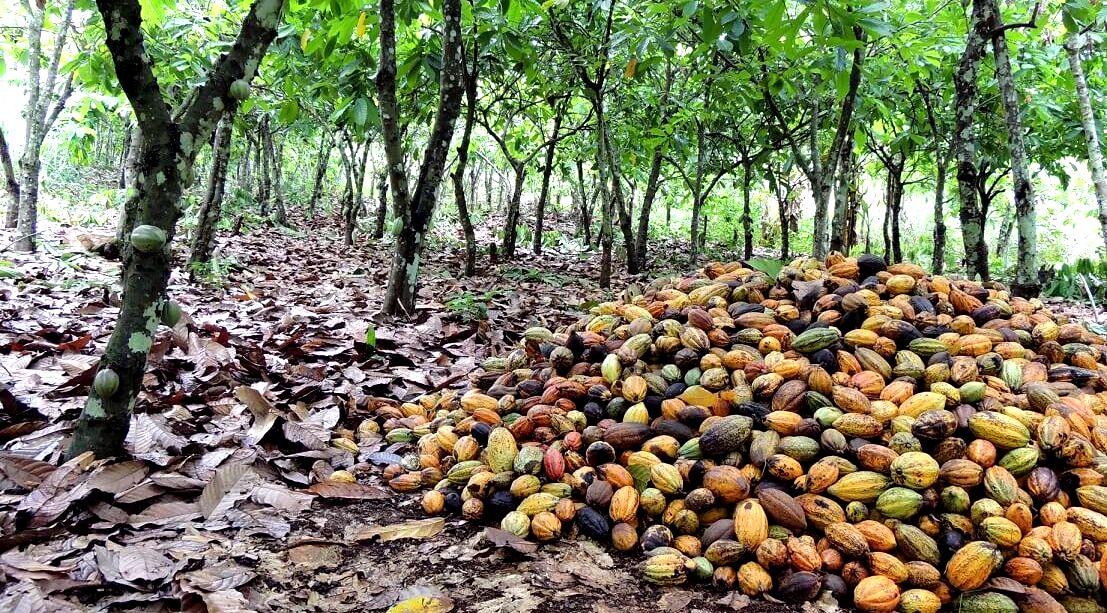- Home
- Worldwide
- CIRAD worldwide
- Projects
- Cocoa4Future project
Sustainability of production systems and new dynamics in the cocoa sector - Cocoa4Future

Crop in an Ivorian cocoa plantation © P. Jagoret, CIRAD
Issues
In 2017, Ivory Coast produced a record 2 million tonnes of cocoa, 42% of the global total. Around a million smallholders make a living from growing cocoa in the country (the same number as in Ghana, the world's second largest producer), against a backdrop of rising tension in terms of land and forest resources. The historically dominant production model, based on expanding the areas planted after having forests cleared by a very cheap labour force (often migrants) is now running out of steam. Having committed to protect the last remaining forests from clearance, Ivory Coast and Ghana are now faced with ageing cocoa plantations and a growing shortage of forest areas that could be used for new cocoa plantings. The challenge of rehabilitating old plantings is further complicated by the presence of the Cocoa Swollen Shoot Virus (CSSV), while climate change means very fluctuating cocoa yields – hence producer incomes – and is exacerbating the effects of CSSV and limiting the zones suitable for cocoa. The unsustainability of cocoa growing in West Africa will eventually make farms more vulnerable, since their operations, and indeed their survival, depend on the crop. The aim is therefore to work with cocoa growers and other cocoa value chain stakeholders to develop technico-economic and organizational models that are innovative, efficient, resilient and sustainable, and guarantee a decent quality of life for families growing cocoa in a context that remains uncertain in economic, ecological and climate terms.
Description
A multi-dimensional assessment of current cocoa systems will be conducted to identify those that are most sustainable, resilient and high yielding. This will enable the co-design of systems combining various tree species, which should meet cocoa growers' expectations. The impact of plant species diversity on the scale insects that carry CCSV will be measured and CSSV integrated control guidelines drafted, while contributing to the design of cocoa agroforestry systems capable of controlling pests and diseases.
A farm monitoring system will pinpoint cocoa growers' technical and social innovations, practices, constraints and decisions. The data gathered will enable a clearer understanding of current dynamics and practices, and dissemination of the most effective on a wider scale, notably those based on diversification (rice growing/fish farming, organic cocoa production, etc). The terroirs and organizational innovations likely to produce ethical, quality cocoa with organoleptic characteristics (taste, flavour, smell) that tally with demand from chocolate makers. The power relations within the sector and the different quality management methods, notably those used by producers' organizations, will be analysed. This could serve to identify levers for socioeconomic sustainability, to boost cocoa producers' incomes. Lastly, advice and support services (both public and private) will facilitate dissemination of the knowledge and practices identified by research activities, with a view to fostering innovation.
Expected impacts
The project will have helped to:
- Promote the separation of cocoa growing from deforestation, while contributing to sustainable management of classified forests and restoration of degraded cocoa plantings;
- Highlight the link between cocoa quality and the various stages of the value chain (from the terroir approach to the impact of fermentation processes;
- Master the epidemiology of the Cocoa Swollen Shoot Virus (CSSV) and limit its impact;
- Fight poverty by boosting cocoa producers' incomes.
Contract partners
- Five Ivorian research organizations: Félix Houphouët-Boigny University (Centre ivoirien de recherches économiques et sociales, Wascal and UFR Biosciences), Ecole supérieure d’agronomie/Institut national polytechnique Houphouët-Boigny (Forestry, and Management, Commerce and Applied Economics Departments), Jean Lorougnon Guede Daloa University (Interdisciplinary Research Group on Landscape Ecology and Environment), Nangui Abrogoua University (laboratories of Ecology and Sustainable Development and Food Biotechnology and Microbiology laboratories), and Centre national de recherche agronomique;
- Two Ghanaian research organizations: Cocoa Research Institute of Ghana, University of Ghana (School of Agriculture and Institute of Statistical, Social and Economic Research);
- Two NGOs: APDRA (fish farming) and Nitidae (value chain creation and organic cocoa);
- Joint Research Centre.























